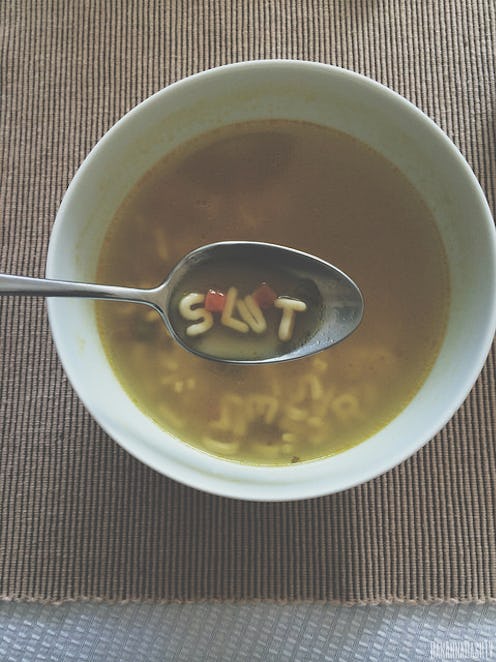Books
This Book Is Called 'Barbara The Slut'. It's Great

If you haven’t tried carrying around a book with the word SLUT printed in all-caps on the cover, you should. And Lauren Holmes’ debut story collection Barbara the Slut and Other People is a great title for this experiment. Take it to the airport, read it on the bus, leave a copy laying on your desk, face up. The book’s title alone will illicit conversations of precisely the kind Lauren Holmes intended, and after reading her book cover to cover, you’ll have many opinions to contribute to the dialogue.
In this fierce debut, Holmes writes lucidly about relationships, break-ups, career paths, and sex. Her often detached (read: unsentimental) characters approach odd situations — from smuggling underwear to Mexico to selling sex toys in San Francisco — with clear heads and invincible armor. Despite the best efforts of their parents, schoolmates, and partners, these characters will not be shamed for their lifestyles. Holmes' portrayal of young, sexually active protagonists is executed with such humor and confidence that you can almost miss the political undertones, which insist on a nuanced and thought-provoking understanding of female sexuality.
I couldn't explain it, but all I wanted to do was be in bed and let him do whatever he wanted to me. Maybe I could have explained it through the high school crush, or through the getting dumped, but it seemed like it was more, or maybe less, than that. Like a purely and exceptionally physical thing.
Though these stories are often about women, they’re not all from women’s perspectives. Holmes approaches relationships from the first-person viewpoints of men, gay women, straight women who pretend to be gay, adolescents, and even (heartbreakingly) a dog. The narrators of these stories often consider themselves trapped with an undesirable partner with whom they endure lengthy communication failures (excepting the dog). In “Mike Anonymous,” for example, Vivian gains the courage to leave her annoying boyfriend when the HIV test comes back positive for one of her patients at the free clinic. She breaks the news to him during sex.
In “I Will Crawl to Raleigh if I Have To,” the narrator, Natalie, takes a different approach. Strongly convicted, she drives her rusted-out car to her boyfriend’s house to call off their courtship. Tranquility overcomes her once the relationship is ended — it almost doesn’t matter that a hole has formed in the floor of her car: “Driving back to the mall I thought I would feel electrified or something, but instead I felt calm.” The characters Holmes creates display no histrionics over the loss of relationships. They’re assertive with their peers (eventually) and ambitious enough to know when they’re being held back.
From story to story, Holmes’ writing style remains consistent: minimal and blunt. The simple sentences and generic responses (“okay,” they repeat) diffuse the scenes’ tension with mixed results. In “New Girls” this technique proves effective. After being snubbed at the 6th grade dance, Stephanie returns to her room: “I climbed up to my bunk and got under the covers. I felt tears coming and turned over to face the wall. I tried not to make any noise. After a minute I heard Natascha get up. She patted me on the back two times, and got back to her bed.” The short sentences here draw attention to the scene and reflect Natalie’s attempt to ignore her emotions and disappear from the situation.
When used with adult characters, however, this same technique can flatten the scene: “It sounded like Mike Anonymous didn’t have any symptoms, so I made an appointment for an STD testing with no symptoms at seven the next night. I ate the last bite of my brown rice cake with peanut butter and went back to work.” This character, the same who dumps her boyfriend during sex, has trouble processing emotion, and so she comes across as wooden, unfeeling. Or, depending on your mood, kind of hilarious. That’s the risk Holmes assumes with her deadpan style.
I hadn't had sex in over a year, partly because I didn't like anyone I met on the internet and partly because I adopted a pit bull who wouldn't let any men into my apartment.
The titular story, positioned in the collection so the reader experiences it last, casts a brilliant back-glow that illuminates the stories previous in unexpected ways. As Bustle wrote earlier, Barbara is “a smart and ambitious high school senior whose love for sex makes her the target of vicious bullying.” Through Barbara’s conviction — she’s going to Princeton — her detachment in dealing with her slut-shaming peers, and her concern for her younger brother, Holmes shows that sexuality doesn’t define or limit her characters except in how others perceive them. Our often toxic, chauvinist culture comes to the foreground and casts its shadow over the book in its entirety.
Barbara the Slut and Other People reinforces the importance of talking openly about sex and of showing the female perspective in nuanced ways. No cliché representations of coupling exist among these pages, and this is an exceptional triumph for a debut writer. Carry the book proudly, and join Holmes in expanding the conversation about the joy, insignificance, and complications of relationships and sex, from a cadre of perspectives.
Images: Anna Dashkova; Christine/Flickr